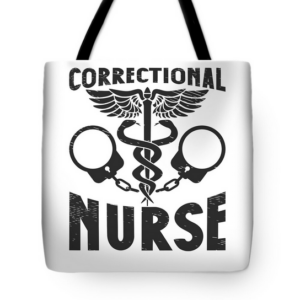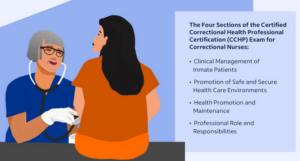Correctional Nurse Career Overview
 Correctional nursing careers involve providing medical care to individuals incarcerated in correctional facilities, primarily focusing on inmates.
Correctional nursing careers involve providing medical care to individuals incarcerated in correctional facilities, primarily focusing on inmates.
Some correctional nurses may also offer their services to the staff, but their main responsibility lies with the incarcerated population.
Correctional nurses work under the guidance of physicians or nurse practitioners and might supervise nursing assistants. Their responsibilities include monitoring the health of inmates, treating medical conditions and injuries, and providing health education and guidance.
This overview will cover correctional nurse responsibilities, job opportunities, how to become a correctional nurse, and the expected salary for correctional nurses.

Struggling to meet your deadline?
Get your assignment on Correctional Nurse Career Overview done by certified MDs and PhDs in the USA. ORDER NOW!
How Long Does It Take to Become a Correctional Nurse?
Typically, it takes 2-4 years to become a correctional nurse. This time includes education and gaining the necessary qualifications.
Job Outlook
The job outlook for correctional nurses is promising, with an expected growth of 9% from 2020 to 2030, which is above average compared to other registered nurses.
Average Earning Potential
The average annual salary for correctional nurses is around $68,185, according to Payscale. Salaries can vary widely based on experience, location, and specific job responsibilities.
A Closer Look at Correctional Nursing
Correctional nurses provide vital healthcare services to inmates in correctional facilities. They focus on assessing and addressing healthcare issues while offering direct care under the supervision of healthcare providers.
Key Qualities for a Career in Correctional Nursing
- Strong communication skills
- Collaborative mindset
- Empathy
- Excellent interpersonal skills
- Effective use of available resources
Where Do Correctional Nurses Work?
Correctional nurses primarily work in jails and prisons. However, they may also find opportunities in halfway houses, group homes for juvenile offenders, and work-release settings.
- Jails or Prisons: Correctional nurses assess healthcare needs, conduct health testing, and educate inmates on preventative health measures.
- Halfway Houses: They help inmates learn about healthy eating and lifestyle choices, providing direct care and education.
- Group Homes: Correctional nurses provide health education on issues like substance use and reproductive health, guiding individuals towards healthy behaviors.

Is Correctional Nursing the Right Path for Me?
Working as a correctional nurse can be physically and emotionally demanding. Inmates may exhibit challenging behaviors, and many have complex health issues. Correctional facilities often face resource constraints, making the job tough but rewarding. Correctional nurses find fulfillment in knowing they provide care to those in need and play a role in rehabilitation.
Advantages of a Career in Correctional Nursing
- Making a difference by teaching healthy or rehabilitative behaviors
- Treating a wide range of health conditions, both chronic and acute
- Gaining appreciation from inmates who may have had limited access to healthcare
- High demand for correctional nurses
Disadvantages of a Career in Correctional Nursing
- Emotionally draining work, with a potential for nursing burnout
- Stringent safety protocols in correctional facilities require vigilance
- Frequent resource limitations in correctional institutions
How to Become a Correctional Nurse
To pursue a career in correctional nursing, you can become a licensed practical/vocational nurse (LPN/LVN), registered nurse (RN), or advanced practice RN. The journey generally involves the following steps:
- Obtain Your High School Diploma or Equivalent: All nursing programs require a high school diploma or GED.
- Graduate from a Nursing Program: You can complete an LPN program (1 year), an associate degree in nursing (ADN, 2 years), or a bachelor of science in nursing (BSN, 4 years).
- Pass the NCLEX-RN or NCLEX-PN: To become licensed, you must pass the appropriate nursing exam.
- Gain Clinical Nursing Experience: Although you can start as an entry-level correctional nurse, gaining experience in other healthcare settings can be beneficial.
- Consider Certification: Although certification is not mandatory, many employers prefer correctional health certifications, like the Certified Correctional Health Professional (CCHP).
- Advance Your Career: You can further your career by earning a Master of Science in Nursing (MSN), which is required to become an advanced practice nurse.
Certifications in Correctional Nursing
There are several certifications available for correctional nurses, including:
- Certified Correctional Health Professional (CCHP): This entry-level certification requires a nursing license but not prior work experience.
- CCHP-RN: Requires the CCHP certification and a two-hour exam on correctional nursing topics.
- CCHP-A: An advanced certification requiring the CCHP and completion of an advanced essay examination.
- CCHP-MH: Focuses on mental health in correctional healthcare, requiring existing CCHP credentials.
 How Much Do Correctional Nurses Make?
How Much Do Correctional Nurses Make?
As of May 2022, the average annual base salary for correctional nurses is approximately $68,185, according to Payscale. The total pay can vary, ranging from $51,000 to $92,000. Correctional nurse salaries are influenced by factors such as experience, required credentials, and geographic location.
Overall, the U.S. Bureau of Labor Statistics predicts a 9% growth from 2020 to 2030 for all registered nurses. However, the growth in correctional nurse positions will depend on various factors, including funding for correctional institutions, changing healthcare needs among inmates, and any regulations that impact staffing levels in correctional settings.
Find Salary Information for Registered Nurses in Specific States

Dont wait until the last minute.
Provide your requirements and let our native nursing writers deliver your assignments ASAP.
Frequently Asked Questions About Correctional Nurses
- How long does it take to become a correctional nurse?
- It can take one year to become an LPN/LVN or two to four years to become an RN, depending on your educational path.
- What kinds of questions are on the CCHP-RN exam?
- The exam covers correctional nursing practices, including policies, legal and ethical issues, and disease prevention.
- Is correctional nursing safe?
- While it can be challenging, strict security protocols help ensure safety for both inmates and staff.
- What unique challenges do correctional nurses face?
- Resource constraints and complex patient backgrounds are common challenges in correctional healthcare.
Resources for Correctional Nurses
-
National Commission on Correctional Health Care:
This organization issues certifications, conducts facility accreditations through peer review, provides professional development opportunities, and publishes standards, newsletters, and a journal. It is not an association and does not have members.
-
American Correctional Nurses Association:
The American Correctional Nurses Association offers professional development, continuing education, including conferences, and advocacy efforts to increase correctional health resources. Full membership is open to nurses and nursing students, while others can join as affiliate members.
-
Academy of Correctional Health Professionals:
This academy issues newsletters and a journal, offers professional development and continuing education in partnership with the National Commission on Correctional Health Care, and connects students and young professionals with mentors. Membership is open to anyone interested in correctional health.
-
American Correctional Association:
The American Correctional Association publishes correctional standards, conducts accreditation, provides professional development and education, and offers certifications, including certifications for correctional behavioral health, health services administrators, correctional nurses, and correctional nurse managers.

